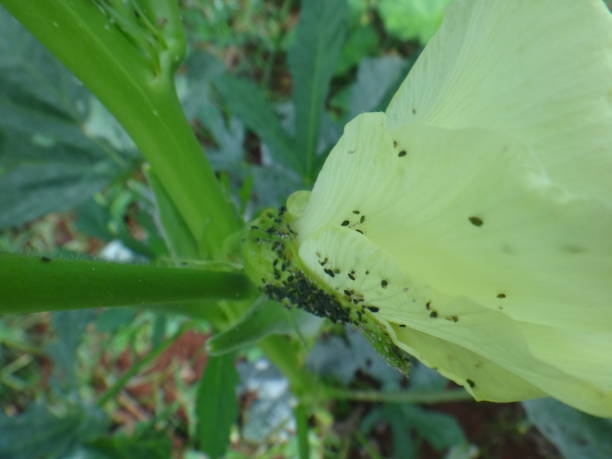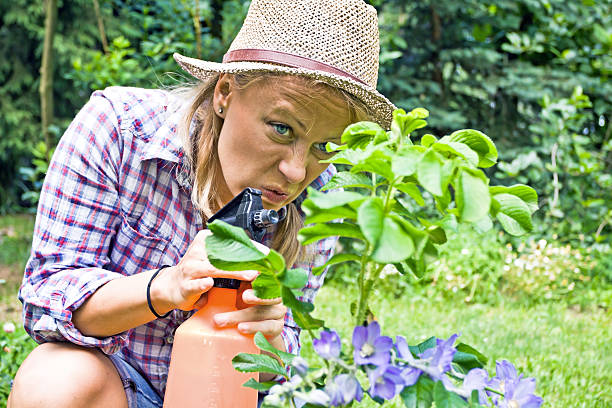Tips and home remedies to fight aphids and drive them away cleverly. Natural home remedies help against annoying pests. You can also use simple tricks to prevent aphid infestation without damaging the plants.
Detect lice on plants
There are many different types of aphids that plague our garden. So you can find black, brown, yellow, or green of these pests. They are usually between one and two millimeters in size. You can also recognize the best by the fact that they usually come together as a larger accumulation on the plant. Then they sit tightly packed as a colony on the leaves and shoots of the plant. So you can see them with the naked eye. They also often leave a sticky substance on the plants called honeydew.

Consequences of aphid infestation
Lice damage the plants, they eat the leaves, and the stems and damage the water-carrying veins. The plant reacts with dry leaves and unsightly leaves. Depending on the type of lice, there are unsightly bulges or spider formations on and on the leaves. The small pests are green, yellowish, or red and have a slightly oval body. In severe infestations, they hang like grapevines from the petioles and trunks of the plant.
Use home remedies for aphids
Vegetable plants, fruit trees, roses, and indoor plants, are everywhere, the lice. If you don’t want to attack them with a chemical mace, you can use natural means. Old home remedies have proven themselves many times over and are now more effective than ever.
1) Fight aphids with natural predators
Depending on the type of lice, exposed predators prove to be ideal for combating aphids. These are available from garden supply stores. When it comes to aphids, ladybugs are the right choice. Ladybugs, various other beetles, and birds are also predators. The disadvantage of the story, they migrate as soon as there are not enough aphids left.
2) Pour or spray with nettle decoction
Add 200 grams of fresh nettles or 20 grams of dried nettles to one liter of water. Leave this brew in the sun for about two days. Nettles that have been cut or cut up work particularly well and release more essential oils, making the brew more potent. If several plants are infested with aphids, you should prepare a larger amount and then let it soak for up to 14 days.
Strain the well-drained brew and place it in a spray bottle or watering can. Plants watered with the nettle broth absorb the substances and the aphids disappear. In the case of heavily infested plants, repeated watering with nettle stock is recommended. This treatment is suitable for all types of plants and is non-toxic, which means that eating the treated vegetables will not harm anyone.
3) Use dish soap or curd soap water
To do this, add a teaspoon of washing-up liquid to lukewarm water and stir. Curd soap water is to be prepared in a similar way. To do this, scrape shavings from the curd soap with a knife and mix them with lukewarm water. Stir the water-soap solution until the soap is completely dissolved. Then pour the liquid into a spray bottle.
Spray the plants with the washing-up liquid or curd soap water. The dish soap or curd soap water prevents the aphids from climbing up the stems and leaves. As a result, they slide down and drown. However, watering with washing-up liquid or curd soap is not advisable for vegetable plants and fruit trees. Fruit or vegetables and also herbs absorb the chemical substances and the purpose of natural pest control is missed. Also, read how to make your own soap.
4) Collecting the vermin
An unorthodox means is to collect the pests. With rubber gloves, the aphids can be easily wiped off the stems of the plants and the solid inflorescences. An old newspaper under the collecting hand prevents the aphids from falling to the ground and making their way straight back up. A bit annoying but effective. The pests are to be killed after collection. Fold the newspaper flat and throw it away with the trash. The aphid population is declining and nothing stands in the way of blooming. If necessary, you must carry out this collection several times. Spraying the plants with stinging nettle broth after they have been collected has proven to increase the success further. In addition, note tips for overwintering plants.
5) Vinegar water, an old household remedy just in case
The vinegar water is not only popular in the kitchen, it protects the garden plants and keeps aphids away. One liter of vinegar to ten liters of water is enough for many ornamental and useful plants in the garden. The smell is a bit annoying on houseplants, but its effect is very strong and better used than the chemical mace in the case of heavy infestations. All plants should be sprayed and watered with vinegar water. There is no risk of damage to the fruit and vegetables. Vinegar water repels the pests by taste and smell. Vinegar water is used once or twice and does not fail to have an effect. Since it contains no pollutants, vinegar water is particularly suitable for the kitchen garden and has been known as a plant protection agent for many centuries.

6) Neem oil to control aphids
Neem oil acts as a natural crop protection agent and is extracted from the seeds of an Indian tree. And the good thing is that it really only harms the pests. Consequently, the best time to spray it on plants in the diluted state is early in the morning. After a few days, the pests should be completely eliminated. It can also be used for watering flowers as it strengthens the plant. You can get pure neem oil in garden centers. You can also find ready-mixed solutions here. Or get the oil from the internet.
7) Horsetail South
To combat aphids, make a decoction from field horsetail. To do this, take a liter of water and bring it to a boil. Then cut a large onion, a head of garlic, and the stalks into small pieces and add them to the boiling water. Also, add some oil. Then let the whole thing cook for 15 minutes and stir it regularly. Then let the sauce cool down. Finally, you can mix the brew with water (1:5) and use it to spray the plants.
